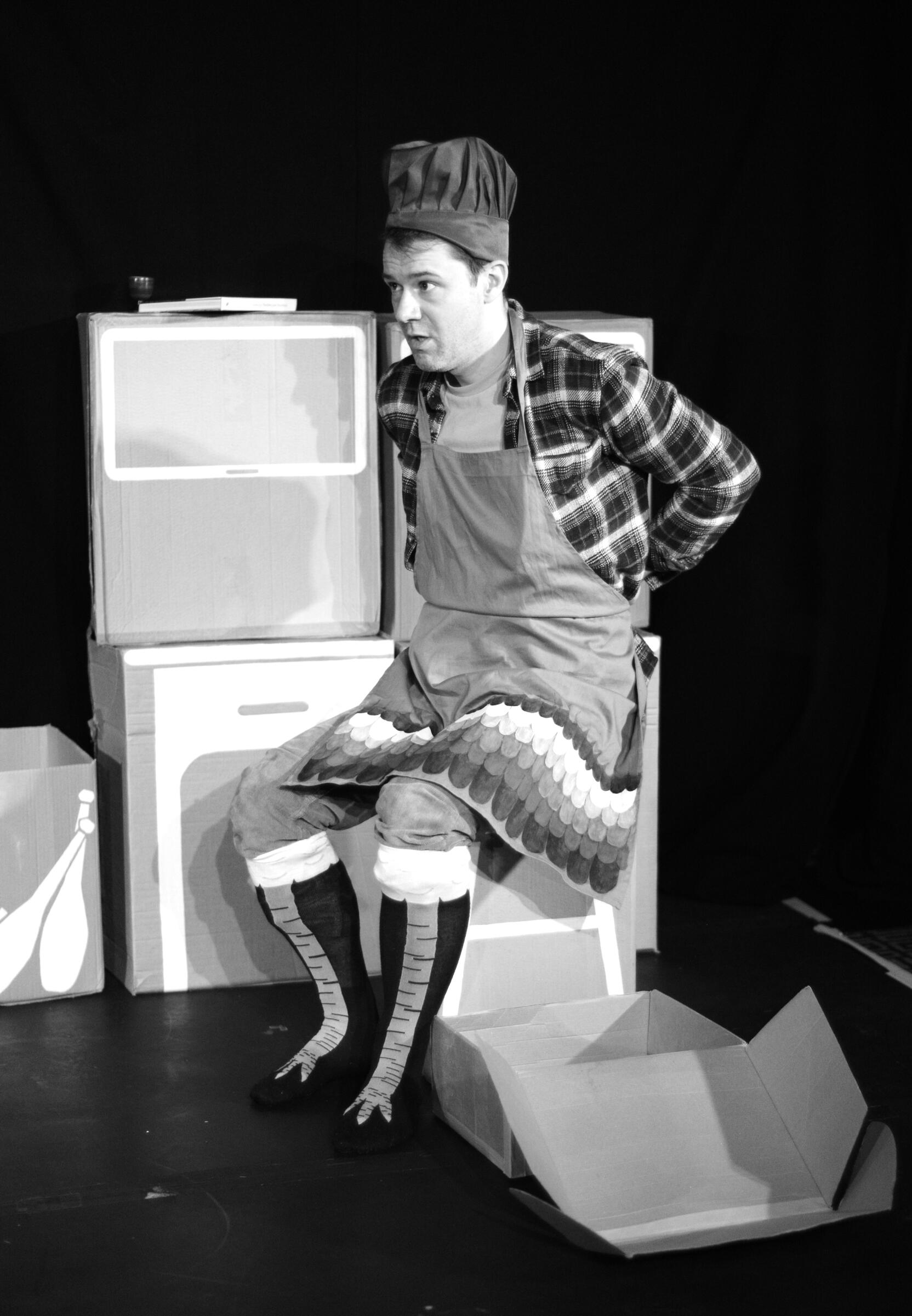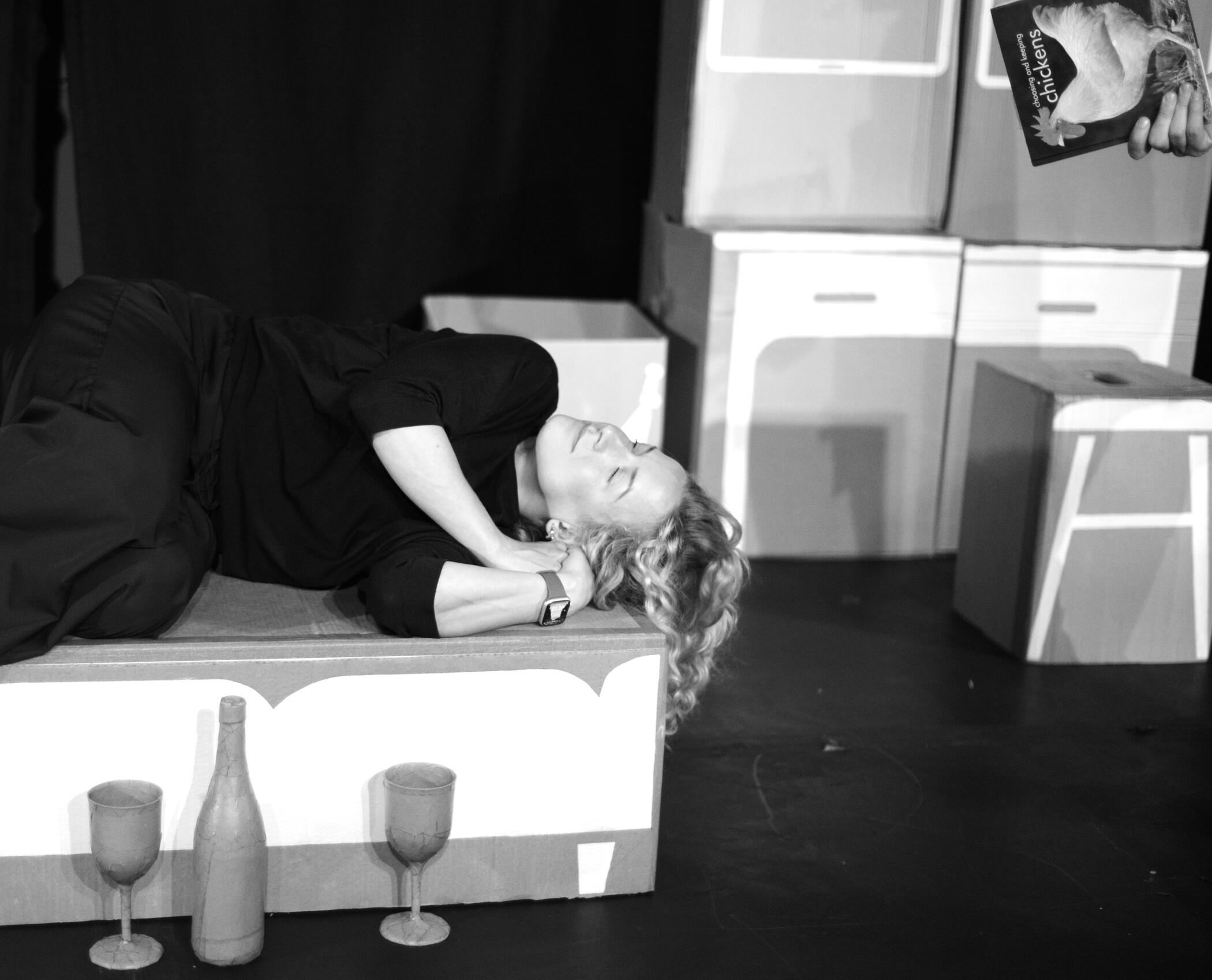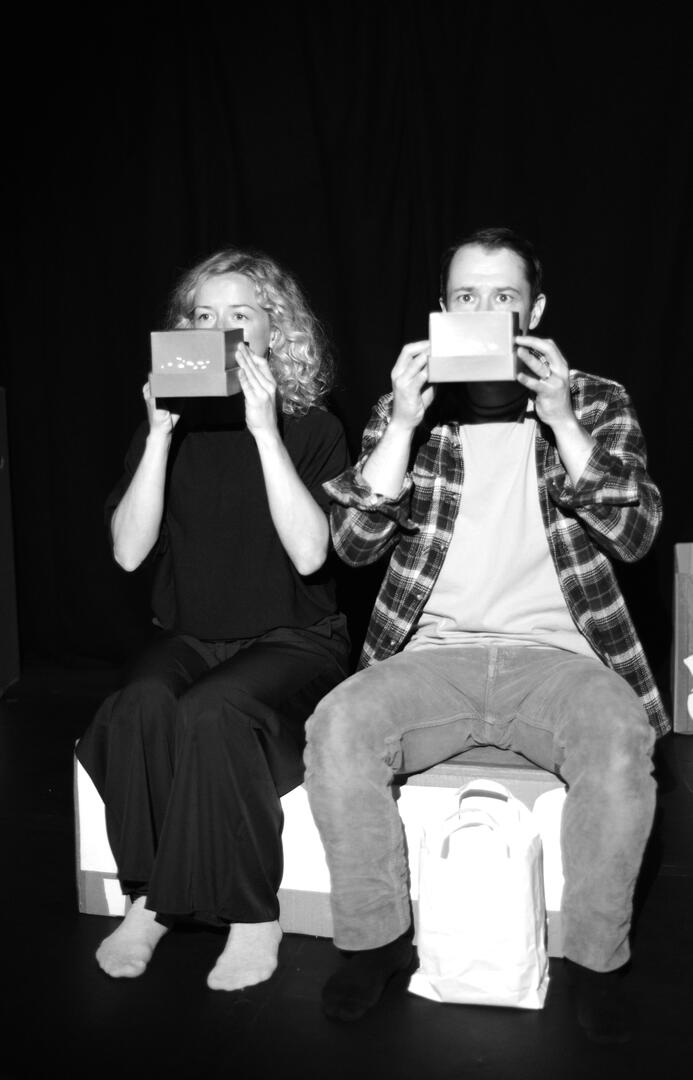Press & Reviews
Press highlights
“Great script, great acting, wonderful set.”
“If there’s an award for the most innovative use of a cardboard box… this show wins it.”
„Ben Harrison directs with intelligence… the play slowly starts to abandon the naturalistic form.”
“A gripping two-hander… surprises at every turn.”
„Chickens is a brilliant work — an interrogation of absurdly stuffy British theatrical conventions, and absurdly stuffy British forms of life.”
THE SCOTSMAN
★★★★
By the end of this play, I never want to hear the word “chickens” again. That’s a testament to the fact it has done its job. As Jay, Owen Whitelaw nails the role of a self-involved boyfriend obsessed with buying laying hens for his flat balcony, against the wishes of his pregnant girlfriend Weronika (Paulina Szarek), a level-headed and long-suffering foil to his madness. Audiences may chuckle as Jay spirals further and further into his galline mania – donning chicken-leg socks, clucking and crowing loudly, even slipping into a chicken-esque waddle – yet there is something more sinister beneath the humour.“You agreed…” “I picked the best option for us,” Jay insists with a smarmy smile, gaslighting Weronika, who has patiently entertained many of his past hobbies – from playing Tibetan gongs to parachuting – and reasonably explained why his latest obsession has just gone too far. Jay just hasn’t listened. Instead, he lays the blame at her door, accusing her of being closed-minded, then booking her theatre tickets and massages without her consent with her so she can “relax” – triggering alarm bells for any woman whose experienced controlling behaviour concealed behind a “nice guy” exterior. By the end of the play he’s left baffled at what went wrong. If there’s a man in your life who thinks women’s frustrations come from nowhere, he needs to see this.
EMILY MAY

all edinburgh theatre
★★★★ Relentlessly ambitious
Jay and Weronika are returning from holiday as Chickens opens. The pandemic looms like a bad dream. And they soon begin a descent into poultry-fuelled domestic madness that goes to the heart of heterosexual dynamics.Monika Klisch’s text would seem to be played by rote, at least on the surface. Yet underneath, the economy of its setup it is relentlessly ambitious. It is, at once, a play about men and women, about childbirth, the pandemic and its aftermath, contemporary inter-personal relationships, the immigrant experience and urban life.
These topics are all delivered through a relationship dynamic which is exhausted and exhausting by design – a text working at the limits of domestic tragedy with a unique absurdist flavour.Ben Harrison directs with intelligence. The characters deceive you at first – you think this is a ten-a-penny drama about incompatible relationships. But then Owen Whitelaw, as Jay, starts to dress up as a Chicken, and the play slowly starts to abandon the naturalistic form.At one point Whitelaw screams with horrific violence before snapping straight back into a smile.Paulina Szarek as Weronika is definitely a straight-man in this dynamic, but she performs the role with pathos and intelligence. Weronika’s experience as an immigrant is conveyed as the cornerstone of the piece. The absurd British obsession with gardens, DIY and domestic life is perfectly encapsulated in Jay’s obsession with raising chickens.This absurd conceit is the perfect Verfremdungseffekt – Brecht’s “alienation effect – to allow a British audience to identify with foreignness.
Laura Bachman’s set is another large part of why the piece functions so well. Everything in Jay and Weronika’s flat is made out of cardboard — from the bed, computer monitor and the sofa to mobile phones and the bottles of wine.Cardboard is an impermanent material, an easily perishable foundation and the perfect encapsulation of the play’s central relationship. This is also an effective distancing effect that draws the audience into the weirdness of the play’s second half.Running at a swift hour, there is a feeling the text had some unfinished business. A more acutely absurd version of this work, where even the couple’s central relationship feels directed by an alien, might unlock an extra layer of potential for a text brimming with it.That being said, Chickens is a brilliant work — simultaneously an interrogation of absurdly stuffy British theatrical conventions, and absurdly stuffy British forms of life. It is directed with a great deal of intelligence and ultimately convinces and compels. This production merits further life.
SALVADOR KENT
FRINGE REVIEW
HIGHLY RECOMMENDED
It’s mid-2021 and we’re in the nightmare that was Covid (remember that?) and “Dishy Rishy” (remember him?) is about to launch his state sponsored “Eat Out And Spread Covid About” campaign.In their cramped Edinburgh flat Jay and Weronika, his Polish partner, are just back from a refreshing break at an Isle of Lewis B&B run by a woman who had her own chickens, producing the freshest eggs Jay has ever tasted, part of a breakfast feast that’s inspirational in his eyes.Duly inspired, Jay wants to recreate this rural idyll on their small balcony whilst Weronika just wants to scrub the place clean in case they’ve accidentally imported a few Covid bugs from the trip home on the bus. He wants marriage. She just wants a visa that will allow her to live in the UK.As they try and sort out what they want from the rest of their lives, they slowly come to realise they are polar opposites; he charming, possessive and chaotic, full of big ideas that somehow he can never quite complete; she pragmatic, prosaic, feet firmly nailed to the floor, relying on routine to feel safe. But opposites attract, don’t they?Yet, as Jay embarks on his latest ill-conceived, madcap project, what appears to be his tenderness, concern and genuine love for his long suffering partner slowly morphs into a subtle struggle between them for control, with the fissure in their relationship widening inexorably until it becomes an unbridgeable crevasse.Chickens is the brainchild of writer/producer Monika Klisch. And it’s a gripping two-hander, not in a “thriller” sort of way but in the surprises it springs on its audience as the relationship spirals down life’s plughole.Jay (played with consummate skill by the engaging Owen Whitelaw), being the complete geek he is, spends an increasing amount of his life focused on chickens, studying their every habit and need, with a view to installing enough of them on their tiny balcony to supply those fresh eggs each morning. As his obsession with his new feathered friends develops, so he takes to living as he imagines a chicken would do in a city flat – hilarious and eerie at the same time.Weronika (played to perfection by Paulina Szarek) surveys her partner’s increasingly eccentric behaviour with commendable sangfroid, as Jay’s passion continually clashes with her more practical approach to life. But the writing’s on the wall as his obsession eats away at their relationship, leading to loneliness in a shared space and to the inevitable denouement.There’s a lot to absorb in this fascinating, slightly absurd and surreal piece of theatre. Acting is right out the top drawer with the characters believably polar opposites, their emotional frustrations conveyed with real intensity. Staging and the use of the small space was exemplary and the sound and lighting effects supportive of the action as it unfolds.But a massive shout out is due to Laura Bachmann for the set (and props) design, which was comprised entirely of cardboard boxes. Boxes for computer screens, for work desks, for the chairs, for the sofa, for the dining table, for the double bed. Oh, and for the mobile phone they both use and for the food they ate. Simply brilliant! If there’s an award for the most innovative use of a cardboard box at the Fringe, this show wins it. Hands down.Great script, great acting, wonderful set. There’s a lot to like here. And a lot to learn from too. “The future is unfucking predictable”, yells Jay as his frustration boils over at his partner’s reluctance to embrace his latest wheeze. If it was back then, what is it now? Highly recommended.
TIM WILCOCK

british theatre guide
★★★★
Returning from holiday post-pandemic, we are introduced to Weronica and Jay. Having endured COVID and come out the other side of it, Weronica wants to settle and live life back to the way it was before, whilst Jay begins this odyssey for chickens. This obsession is new for Jay and follows on from previous obsessions that he has had, and which have been dropped… after a period of time.Unfortunately for Weronica, this is not something that's going to be dropped. Weronica is Polish and waiting for papers to become a naturalised citizen in the United Kingdom, and therefore in a fragile position in comparison to Jay. Jay sees nothing wrong with the two of them getting married, whilst Weronica wants to feel secure for herself first. It is the first indication of the breakdown between them.Once Weronica discovers that she is pregnant, the distance between them begins to expand further, and when she takes the opportunity to go back to Poland to see her mother, their nice wee cosy flat is turned into a place filled with a feral man, Jay, looking to indulge his fantasy. Throughout, Jay has kept going but left Weronika very much behind in his wake. She becomes a woman increasingly attempting to avoid any form of contact with him, which is easy enough as Jay creates a physical barrier between them. The final scene sees her making a desperate choice with Jay not quite sure what it is that he has done wrong but managing nonetheless to still be obsessed with what he has but missing out on what he's lost.This is a first-time play by Monika Klisch with Grid Iron's Artistic Director helming. Harrison captures the absurdity of this as well as the subtleties of the relationship between Jay and Weronica. The script is a very light touch, showing skill in allowing characters to breathe and become rather than to expose and reveal. It allows the directorial touch to expand the emotional universe between them through movement and the set which is really enchanting.The cast are highly skilled with Owen Whitelaw as Jay giving unremitting belief and absurdity of his obsession along with a handle on reality as he slowly begins to retreat into himself, portraying a man who sees no choice but to simply continue to try and convince Weronica rather than abandon this nonsense. Paulina Szarek as Weronica matches Jay’s performance through well-directed reaction and acts as our own sense of disbelief onstage. The nature of the love between the characters is obvious, which means this works. It is the little things that convince.The difference between the two is matched by physical barriers put up by Jay as Weronika is increasingly falling in upon herself until the final phone call she has with her mother, and we are clear as to what it is that she's going to do next.We know, but Jay is yet to find out.Harrison understands how to translate new writing onto a platform like here. It is deft, and you can see how the writing has been developed and challenged by the recreation of it into a physical space. The use of audio to interact with what is happening on stage is inspired; a very imaginative set with outlines telling us what the boxes are—eating the hamburger is genius—encourage both writer and cast to engage more because of the effect this has on an audience.As a package, this really fits into and onto a stage. New writing can often feel like it needs a redraft, but here I thought there was little which may need change. It works as a two-hander; the physicality was a pertinent exercise in seeking which genre it fits and drama as a medium is perfect.The only area where I thought it needed some more was in the developing performance. At times, there are slight gaps in picking things up, and whilst the tone varies well in an engaging manner, it found pacing going a little fast, towards the end it became faster still, which I found heightened the absurdity and perhaps could have been used more earlier.However, this demonstrates that when the Fringe has a platform for new writing and you have a seasoned director with a highly skilled cast, we get a measured new piece of theatre—who knew?
DONALD C STEWART

